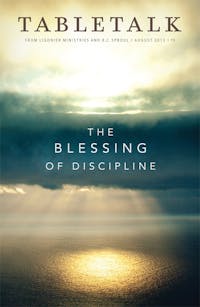
Request your free, three-month trial to Tabletalk magazine. You’ll receive the print issue monthly and gain immediate digital access to decades of archives. This trial is risk-free. No credit card required.
Try Tabletalk NowAlready receive Tabletalk magazine every month?
Verify your email address to gain unlimited access.
The writer of the letter to the Hebrews exhorts us to “consider how to stir up one another to love and good works” (Heb. 10:24). In other words, we are to carefully ponder or study how we might encourage or stimulate each other to love God and our neighbor, in fulfillment of the two great commands that Jesus gives in Matthew 22:37–40. Authentic love for God and neighbor is not a mere warming of our affections, however, but as the writer of Hebrews assumes, always manifests itself in good deeds.
Of course, this command to encourage others applies in all of our relationships, but for those of us who are married, perhaps it applies most particularly to our spouses. In other words, part of my vocation as a wife, is to spend time carefully thinking how I might encourage my husband, Phil, to love God and his neighbors and to do them good. How might I do that? What would it mean for me to give a careful consideration to the ways I might inspire Phil to a love that eventuated in good deeds? Should I make a list of good things that Phil might do and give it to him every morning along with his cup of coffee? “Here’s your Love and Good Deed List for the day, Dear: Go next door and offer to mow our neighbor’s lawn.” Knowing Phil, he might respond back with “Make dinner for the lady across the street.” But is this list-making what the writer of Hebrews has in mind when he calls us to stir up one another to love and good works?
Although this kind of thing might be helpful for some people, I doubt that writing a list of “errands for others” would eventuate in the kind of “faith-working- through-love” motivation that transforms our good deeds from worthless to valuable (Gal. 5:6). Why not? Because only deeds that are performed solely out of love for God qualify as being truly good. Mowing our neighbor’s lawn might actually have nothing to do with Phil’s love for God and neighbor. It might be a way to win my favor, avoid my criticism, become more popular on our street, or reassure his heart that God is smiling at him. No, his good deed needs to be performed out of a true, selfless love for God and neighbor—not out of self-love, self-protection, competition, or reputation-building.
Where would this kind of love come from? First John 4:19 tells us that “we love because he first loved us.” Our work-producing love for God is engendered first by considering how we’ve been loved, and the broader context of Hebrews 10:24 is a wonderful place to start in considering how much we have been loved—since it is filled with such good news.
What might I do to encourage Phil to love God? I might remind him of Hebrews 10:14, “For by a single offering he has perfected for all time those who are being sanctified,” or perhaps 10:17, “I will remember their sins and lawless deeds no more.”
As I soak my soul in the truth that I’ve been “perfected for all time” in Christ and that the Lord has forgotten all my “sins and lawless deeds,” my own heart will burst into flame and that warmth will inevitably be communicated to Phil. “We’ve been so loved. We’ve been completely forgiven. We’re perfect in His sight.” These are the words that will fill Phil’s heart with love for God and neighbor. Then, as we are fully at rest and satisfied in His love and forgiveness, we will be freed to look outward, away from ourselves, away from our merit-earning or score-keeping, knowing that all things have already been given to us in Christ Jesus our Lord (1 Cor. 3:21). It will be then that our hearts will be prepared to see what our neighbors need and that we will be willing to seek to meet those needs out of the abundance that God has so lavishly poured on our unworthy souls.
Jesus’ perfect example of “love and good deeds” flowed out of a heart that habitually responded, “I have come to do your will” (Heb. 10:5–9). What was that will that He continually said yes to? It was nothing less than His once-for-all offering of His body and blood for our holiness (v. 10).
Do we have any heartwarming good news for our spouses? Yes, of course. But it isn’t merely the good news of Christ’s example in willingly laying down His life for our sake. The good news is so much greater than His example. It is that Phil, whether he mows the neighbor’s lawn or not, has the righteous record of Christ right now—a righteousness that Jesus earned over three decades of always loving God and His neighbor, of always saying yes to His will. In all those hidden years in Nazareth, in all His time of public ministry, He was fulfilling the law of love for us, in our place. And because of the resurrection, Phil and I can be assured that we stand completely justified before our Heavenly Father (Rom. 4:25). We have good news. We have Christ’s record of obedience imputed to us by faith alone: just as if we had never sinned, just as if we had always obeyed. It is when we live in the light of these marvelous truths that our hearts will burst into flame, and we will be stimulated to love our neighbors and serve them with good deeds.
